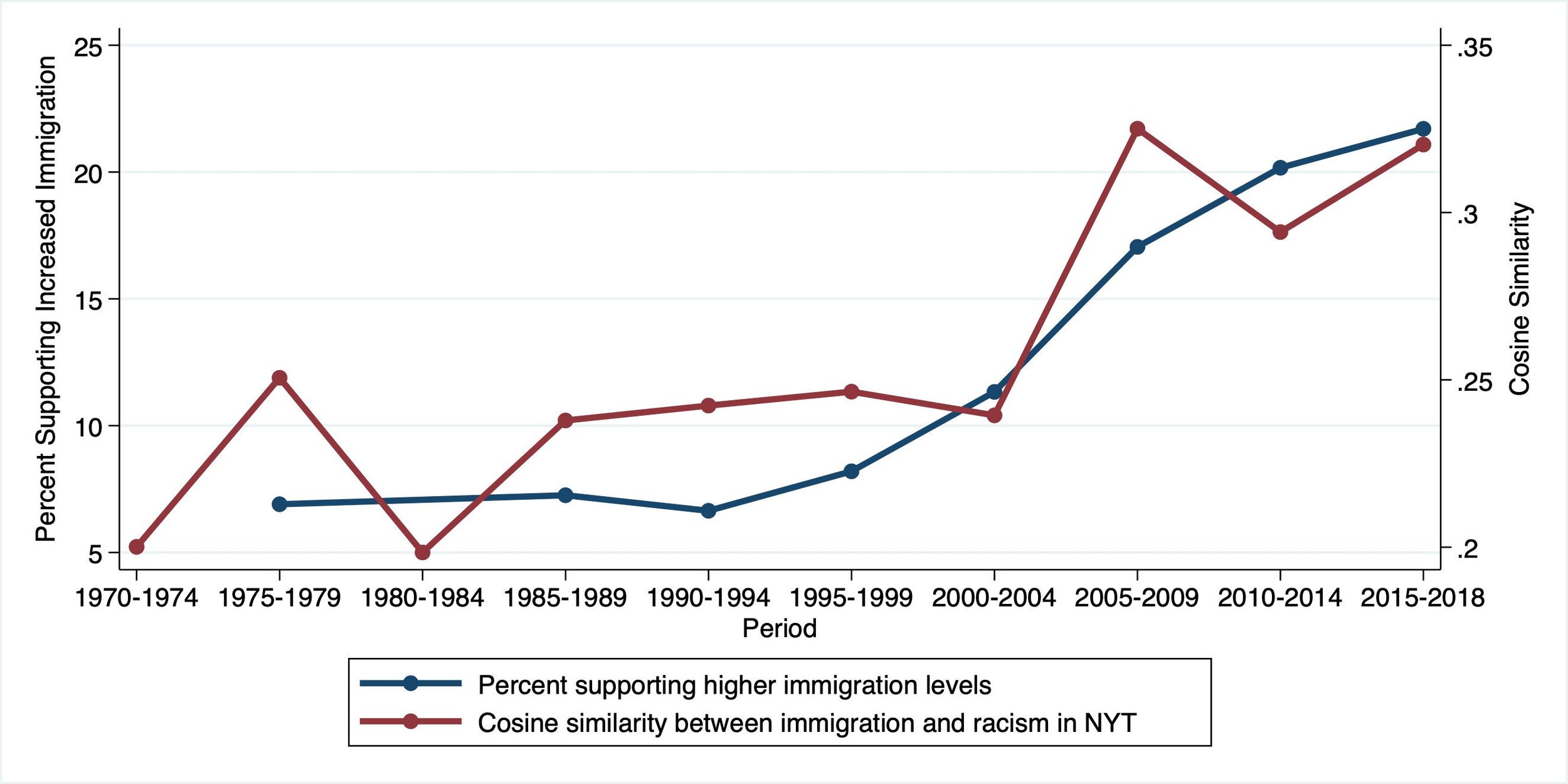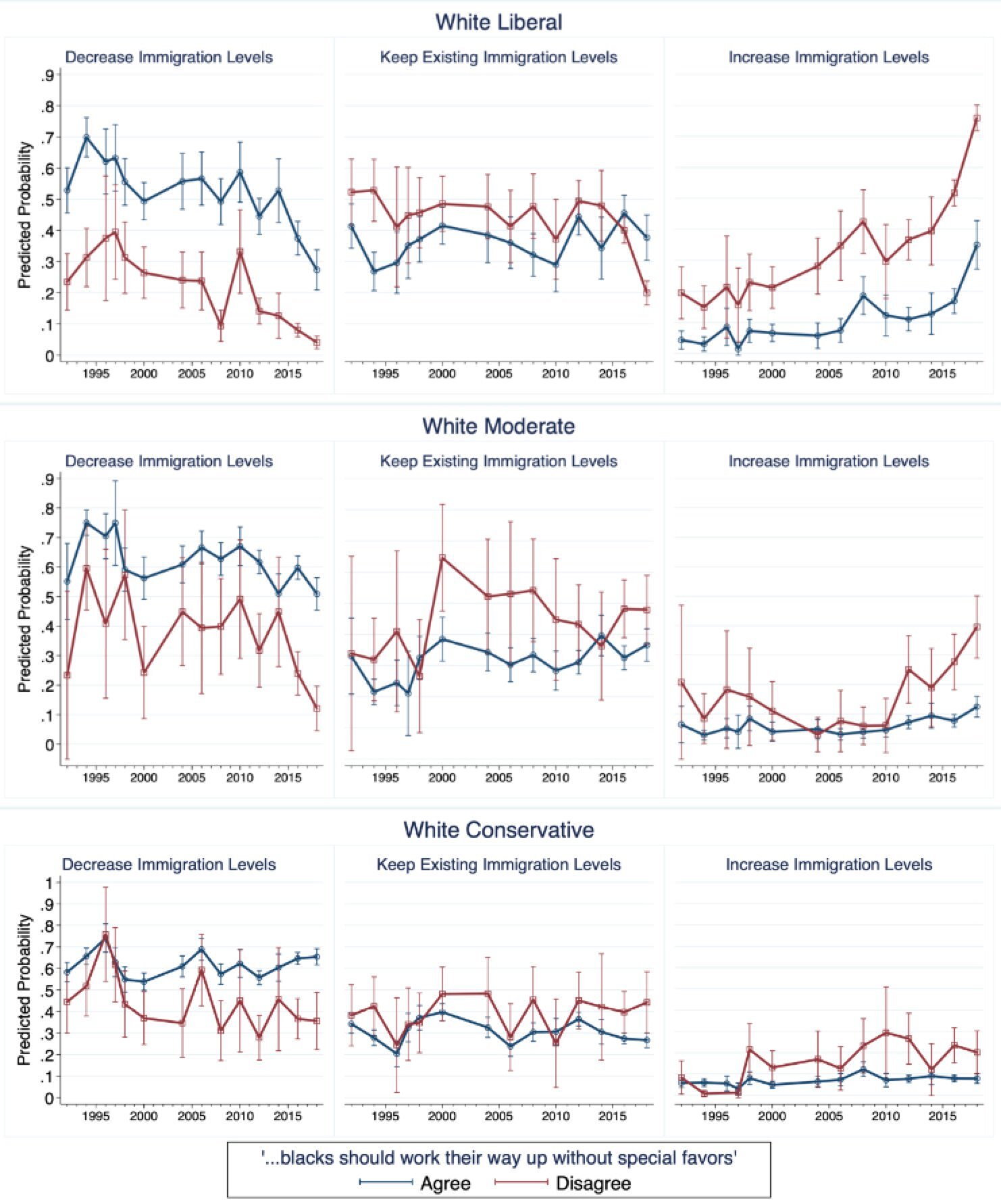The Long View 2007-06-01: The Culture Wars and Immigration

The mid- to late-2000s was the point in time where opposition to immigration to the United States came to be associated with racism. As political science grad student Zach Goldberg notes, much of the change in expressed attitudes come from white liberals, while the rest of the country hasn’t changed nearly as much.

Here, John J. Reilly {RIP] quote Fr. Richard Neuhaus [RIP] to the effect that
On this matter, neither the Republican Party nor the Catholic Church (at least with regard to the United States) are on the side of people who normally identify themselves as cultural conservatives. Now there is tinder for a realignment for you.
The realignment hasn’t settled out yet, but it does look like it is in process.
The Culture Wars and Immigration
The culture wars have been declared over every few years since they started, and the Vicar Richard John Neuhaus is suitably skeptical about the most recent Obituary for the Culture Wars
Waiting for me upon my return from Rome was Jacob Heilbrunn’s review in the New York Times Book Review of Dan Gilgoff’s The Jesus Machine, an informed and not entirely unsympathetic book on James Dobson and his Focus on the Family. Heilbrunn concludes with this:...Jacob Heilbrunn is a keen reader of the signs of the times, and I expect that the herd of independent minds will be following his lead, providing us in the months ahead with a flow of punditry on the death throes of the religious right. It was a narrow escape, but the threat of theocracy is receding, and the natives have been returned to their proper place at the margins of our public life. It is advisable to keep an eye on them, but they are now more nuisance than danger. Once again, just as in Hollywood Exhibits A through Z, democracy has been saved from government by the consent of the governed.
The belief that the natives have been contained rests on two serious misapprehensions:
(1)The assumption that the Right in the culture wars was more than instrumentally identified with the Republican Party;
(2) The failure to recognize that the immigration issue has joined the list of contested items.
On this matter, neither the Republican Party nor the Catholic Church (at least with regard to the United States) are on the side of people who normally identify themselves as cultural conservatives. Now there is tinder for a realignment for you.
* * *
But to what shall we compare the Bush Administration these days? To a Microsoft product perhaps: to me, at least, trying to understand the White House these days is like doing complicated document formatting in Word. There comes a point when you start to pound the desk and shout, "Why is it doing that now? And how do I get it to stop!?!" One notes with sympathy the bewilderment evident in this exchange between Hugh Hewitt and Mark Steyn:
HH: Now coming up after my conversation with you is Jeffrey Goldberg of the New Yorker, who wrote in this week’s issue Party Unfaithful, and he goes around and he quotes Newt Gingrich and Tom Delay about the “Republican implosion.” I think he mistakes the Bush implosion from the Republican implosion. I think that the immigration bill is a bridge too far for a lot of people, and it’s really broken a lot of backs on this. But I don’t think it’s broken the party back. What do you think?
MS: Well, I’m not so sure about that. I mean, it’s clear that if you align with Bush on this issue, then your numbers go south among Republican primary voters. That’s the problem with John McCain. And I must say, as someone who has stuck with the President a lot more than many of my colleagues have in recent months, I strongly disagree with the President effectively trying to damn his Republican opponents on this immigration bill as somehow scaremongers, or just slapdash types who haven’t read the bill properly.
I am reliably informed that part of the problem with the Bush Administration these days is that it is focusing so single-mindedly on Iraq that it cannot give systematic attention to any domestic issue. If that is so, then it would have been better to let the immigration matter lapse for the present rather than try to address it in an absent-minded fashion.
In general, the Bush Administration seems to have never grasped that its domestic policies must energize the popular sentiment necessary to support its foreign policy. Lincoln, Theodore Roosevelt, Wilson and FDR did that, with notable success. The failure of the Johnson Administration confirms the rule: the Great Society initiative was perceived, whether fairly or not, to be directed exclusively at the betterment of the poor and minorities, while it was the majority whose mobilized support the Administration needed.
* * *
I was given a preliminary glimpse of the collapse of the New Deal Democratic Party, not that I had appreciated it at the time. When I was in high school, I knew a number of aging party hacks suitable for my age and condition, people who had gone to every Democratic presidential convention since the Truman Administration. Attendance was a perk, an acknowledgement of many decades of seedy but reliable work for the local Democratic machine. Then, in 1971, they learned that they would not be attending that year's Democratic Convention. They were, frankly, just not cool enough to attend a convention where Gary Hart and Warren Beatty would be among the activist luminaries. My hack elders were not pleased, which went a long way toward explaining how badly the Democratic candidate, George McGovern, did in the subsequent general election.
I was reminded of this policy of betrayal by the party leadership by Peggy Noonan's blistering column in today's Opinion Journal:
What conservatives and Republicans must recognize is that the White House has broken with them. What President Bush is doing, and has been doing for some time, is sundering a great political coalition. This is sad, and it holds implications not only for one political party but for the American future. ...The president has taken to suggesting that opponents of his immigration bill are unpatriotic--they "don't want to do what's right for America." His ally Sen. Lindsey Graham has said, "We're gonna tell the bigots to shut up." On Fox last weekend he vowed to "push back." Homeland Security Secretary Michael Chertoff suggested opponents would prefer illegal immigrants be killed; Commerce Secretary Carlos Gutierrez said those who oppose the bill want "mass deportation." Former Bush speechwriter Michael Gerson said those who oppose the bill are "anti-immigrant" and suggested they suffer from "rage" and "national chauvinism."...It is odd, but it is of a piece with, or a variation on, the "Too bad" governing style. And it is one that has, day by day for at least the past three years, been tearing apart the conservative movement.
The term "conservative" is becoming unhelpful, I suspect.
Copyright © 2007 by John J. Reilly
Support the Long View re-posting project by downloading Brave browser. With Both Hands is a verified Brave publisher, you can leave me a tip too!



Comments ()